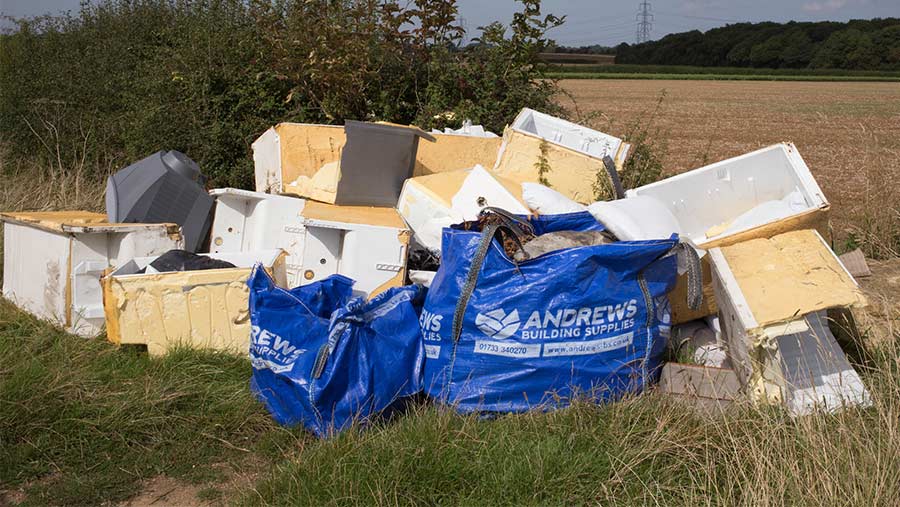Farmers paying cost of fly-tipping, as prosecution rates drop
 © Tim Scrivener
© Tim Scrivener Defra has released figures from its annual report on fly-tipping, showing that, in the past year alone, local authorities across the country have dealt with more than 1m incidents.
The figure stands at 1.08m incidents for 2022-23, which is actually a 1% decrease from the 1.09m reports of fly-tipping in the year prior.
However, rural campaigners have been quick to point out that these figures do not include instances of fly-tipping that occur on private land, with the Country Land and Business Association (CLA) highlighting the severity of this “blight” on the countryside.
See also: Thieves target farms in winter rural crime spree
CLA president Victoria Vyvyan said: “These fly-tipping figures barely scratch the surface of a crime that’s blighting rural communities, with incidents on private land going unrecorded on a mass scale.
“Farmers and landowners bear the cost of removing rubbish and they pay, on average, £1,000 to remove waste. This is not a victimless crime – in some cases, they have paid up to £100,000 to clear up other people’s mess or risk facing prosecution themselves.
“It’s not just litter blotting the landscape, but tonnes of household and commercial waste, which can often be hazardous – even including asbestos and chemicals – endangering farmers, wildlife, livestock, crops and the environment.”
The official figures show that, despite the high instances of fly-tipping, just 1,491 court fines were issued, with the combined value of these fines decreasing by 6% to £785,000.
Ms Vyvyan continued: “While courts can sentence offenders to prison or unlimited fines, prosecutions are rare and criminals clearly do not fear the system.
“We are calling for local authorities to help clear fly-tipping incidents on private as well as public land, while the various enforcement agencies must be properly trained and resourced.
“Without more progress, farmers, not the criminals, will continue to pay the price.”
Concerning
Meanwhile, the NFU called the latest figures “concerning”, but praised the government for its proposed initiatives to try to combat the issue.
These include increasing the maximum penalty for fly-tipping from £400 to £1,000 as part of the Antisocial Behaviour Plan, and funding a new fly-tipping post within the National Rural Crime Unit.
NFU vice-president David Exwood called for councils to have “police-style powers” to combat the issue.
He said: “The NFU believes more can and should be done, including better promoting the household duty of care to ensure all householders are aware that their responsibility for waste disposal is maintained to its final disposal point.
“We also want to see accreditation for all council enforcement officers to give them enhanced police-style powers to tackle fly-tipping and littering.
“This is affecting farmers’ efforts to produce food and care for the environment, but is also taking a huge toll emotionally and financially.”
